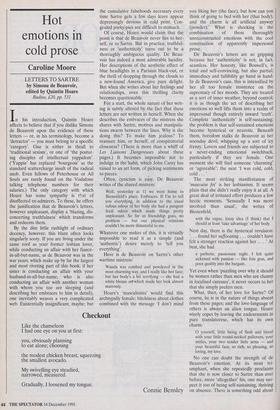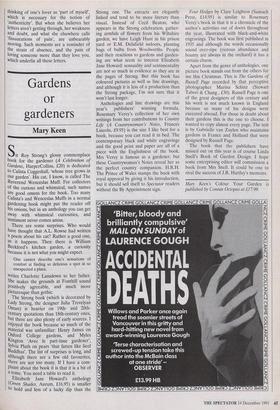Hot emotions in cold prose
Caroline Moore
LE 1 1ERS TO SARTRE by Simone de Beauvoir, edited by Quintin Hoare Radius, £20, pp. 531 In his introduction, Quintin Hoare affects to believe that if you dislike Simone de Beauvoir upon the evidence of these letters — or, in his terminology, become a `detractor' — you must belong to a specific `category'. One is either in thrall to `traditional sexism', or one of 'the postur- ing disciples of intellectual yuppidom'. (`Yuppie' has replaced 'bourgeois' as the standard scattercharge insult of the radical snob. Even fellows of Peterhouse or All Souls are rarely found on the Vodafone talking telephone numbers for their salaries.) The only category with which Hoare has some sympathy is that of disaffected ex-admirers. To these, he offers the justification that de Beauvoir's letters, however unpleasant, display a 'blazing, dis- concerting truthfulness' which transforms and redeems them.
By the dim little rushlight of ordinary decency, however, this blaze often looks singularly sooty. If you are living under the same roof as your former lesbian lover, while conducting an affair with her fiancé- in-all-but-name, as de Beauvoir was in the war years, which make up by far the largest and most riveting part of this book; if her sister is conducting an affair with your husband-in-all-but-name; who is also conducting an affair with another woman with whom you too are sleeping (and describing her embraces to him in detail), one inevitably weaves a very complicated web. Existentially insignificant, maybe; but the cumulative falsehoods necessary every time Sartre gets a few days leave appear depressingly devious in cold print. Con- gealed porky-pies are difficult to stomach.
Of course, Hoare would claim that the point is that de Beauvoir never lies to her- self, or to Sartre. But in practice, truthful- ness or 'authenticity' turns out to be a thoroughly ambiguous quality. De Beau- voir has indeed a most admirable lucidity. Her descriptions of the aesthetic effect of blue headlights in a Parisian black-out, or the thrill of dropping through the clouds to a new-found America, give pure delight. But when she writes about her feelings and relationships, even this thrilling clarity becomes questionable.
For a start, the whole nature of her writ- ing is subtly altered by the fact that these letters are not written to herself. When she describes the embraces of the mistress she shares with Sartre, motives and manipula- tions swarm between the lines. Why is she doing this? TO make him jealous? To reassure him, or herself, of conspiratorial closeness? (There is more than a whiff of Les Liaisons .Dangereuses about these pages.) It becomes impossible not to indulge in the-habit, which John Carey has raised to an art form, of picking sentiments to pieces.
Often, Cynicism is easy. De Beauvoir writes of the shared mistress:
Well, yesterday at 11 we went home to Bienenfeld's place. Embraces. If I'm to tell you everything, in addition to the usual rufous odour of her body she had a pungent fecal odour which made things pretty unpleasant. So far as friendship goes, no problem — but our physical relations couldn't be more distasteful to me.
Whatever one makes of this, it is virtually impossible to read it as a simple (and `authentic') desire merely to 'tell you everything'. • Here is de Beauvoir on Sartre's other wartime mistress:
Wanda was combed and powdered in the most charming way, and I really like her face; but her body's a bit terrifying — she had a white blouse on-which made her look almost matronly.
Hoare's `masculinists' would find this archtypally female: bitchiness about clothes combined with the message 'I don't mind
you liking her (the face), but how can you think of going to bed with her (that body), and the charm is all artificial anyway (powder).' What is shocking is the combination of these thoroughly unreconstructed emotions with the cool construction
of apparently impersonal prose.
De Beauvoir's letters are so gripping because her 'authenticity' is not, in fact, seamless. Her honesty, like Boswell's, is total and self-convincing, but also partial; immediacy and fallibility go hand in hand. In de Beauvoir's case, this is intensified by her all too female insistence on the supremacy of her moods. They are treated as a sort of inner weather, beyond control; it is as though the act of describing her emotions so well lifts them into a realm of impersonal though entirely inward 'truth'. Complete 'authenticity' is self-sustaining; the problem is that self-sustained emotions become hysterical or neurotic. Beneath them, boredom stalks de Beauvoir as her noonday devil, whipping up a sort of icy frenzy. Lovers and friends are subjected to a never-ending emotional switchback, particularly if they are female. One moment she will find someone 'charming' or 'agreeable'; the next 'I was cold, cold,
cold '
The most striking manifestation of emauvaise foi' is her lesbianism. It seems plain that she didn't really enjoy it at all. A great deal of irritated effort produces a few hectic moments. 'Sensually I was more involved than usual', she writes of Bienenfeld,
with the vague, lousy idea (I think) that I should at least 'take advantage' of her body.
Next day, there is the hysterical revulsion: found her suffocating . . . Couldn't have felt a stronger reaction against her ....' At best, she had
a pathetic, passionate night. I felt quite sickened with passion — like foie gras, and poor quality into the bargain.
Yet even when 'puzzling over why it should be women. rather than men who are clumsy in localised caresses', it never occurs to her that she simply prefers men.
What, then, of her love for Sartre? Of course, he is in the nature of things absent from these pages; and the love-language of others is always an alien tongue. Hoare wisely copes by leaving the endearments in pure .translatorese, which has its own charm: 0 yourself, little being of flesh and blood with your little round-necked pullovers, your smiles, your two tender little arms — and your beautiful face, so rich, so pleasing, so loving, my love.
No one can doubt the strength of de Beauvoir's emotion. At its most tri- umphant, when she repeatedly proclaims that she is now closer to Sartre than ever before, more 'altogether' his, one may sus- pect it too of being self-sustaining, thriving on absence. There is something odd about
thinking of one's lover as 'part of myself, which is necessary for the notion of `authenticity'. But when she believes her letters aren't getting through, her weakness and doubt, and what she elsewhere calls lissuarations of pain', are unbearably moving. Such moments are a reminder of the strain of absence, and the pain of loving someone more than they love you, which underlie all these letters.



































































 Previous page
Previous page